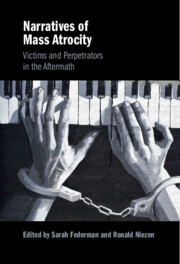Narratives of Mass Atrocity
Individuals can assume – and be assigned – multiple roles throughout a conflict: Perpetrators can be victims and, vice versa, heroes can be reassessed as complicit and compromised. However, accepting this more accurate representation of the narrativized identities of violence presents a conundrum for accountability and justice mechanisms premised on clear roles. This book considers these complex, sometimes overlapping roles, as people respond to mass violence in various contexts, from international tribunals to NGO-based social movements. Bringing the literature on perpetration in conversation with the more recent field of victim studies, it suggests a new, more effective, and reflexive approach to engagement in post-conflict contexts. Long-term positive peace requires understanding the narrative dynamics within and between groups, demonstrating that the blurring of victim–perpetrator boundaries, and acknowledging their overlapping roles, is a crucial part of peacebuilding processes. This title is also available as Open Access on Cambridge Core.
Sarah Federman is Associate Professor of Conflict Resolution in the Joan B. Kroc School of Peace Studies at the University of San Diego, an instructor at the Foreign Service Institute, and a Fulbright Peace and Conflict Specialist. She is the co-editor of Introduction to Conflict Resolution: Discourses and Dynamics (2019) and the author of Last Train to Auschwitz: The French National Railways and the Journey to Accountability (2021).
Ronald Niezen is Distinguished James McGill Professor of Anthropology and Associate Member of the Faculty of Law at McGill University. He has researched an Islamic reform movement in West Africa and justice campaigns in indigenous communities in Canada and in a variety of international organizations. He has held visiting positions at Åbo Akademi University in Finland and the Weatherhead Center for International Affairs at Harvard University. His many books include The Origins of Indigenism (2003), Truth and Indignation (2017), and #HumanRights (2020).



